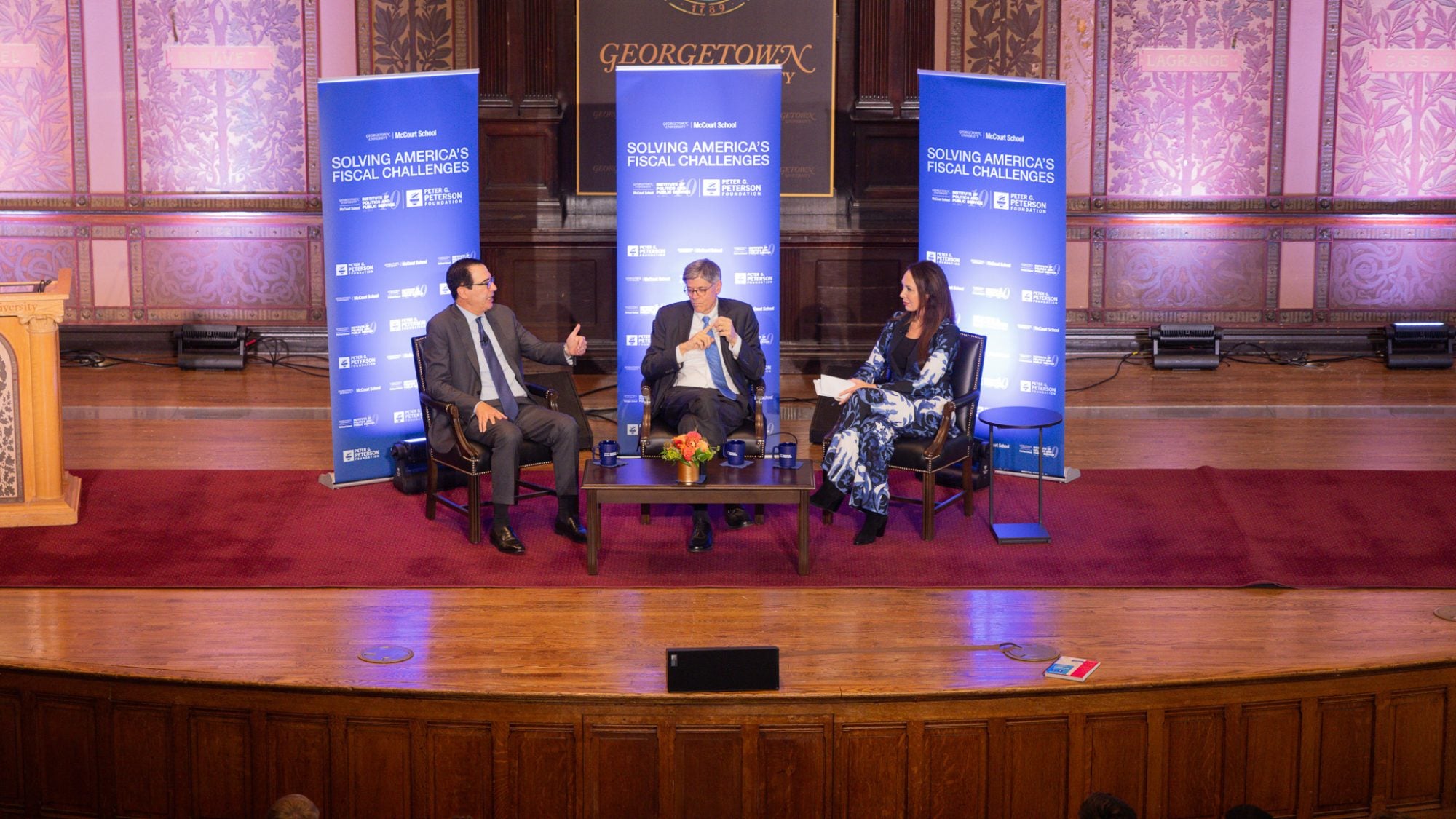On Thursday, October 9, GU Politics in partnership with the Peter G. Peterson Foundation hosted a conversation on the state of the economy with two former Secretaries of the Treasury. Jack Lew, who held the position during the Obama administration, and Steven Mnuchin, who served in the first Trump administration, talked with Associated Press Reporter and Spring 2025 GU Politics Fellow Meg Kinnard (SFS ’02) about the fiscal challenges the country currently faces and how they might be solved.
Read a recap below.
Before the discussion of fiscal issues, Kinnard asked for Mnuchin and Lew’s thoughts on the recently announced Israel-Hamas ceasefire, especially relevant to Lew, who served as ambassador to Israel under President Joe Biden. Both secretaries emphasized their belief in the release of hostages as a priority for the peace process.
After this, the conversation returned to the main topic of the debt crisis. Highlighting that the cost of servicing the debt is now equivalent to the defense budget, Lew argued that America’s $37 trillion deficit was not yet creating an economic crisis, with headline macroeconomic indicators remaining strong. It is only when the debt begins to have economic ramifications felt by ordinary Americans that the President and Congress will be forced to take action, Lew said, though he was also clear in stating that action must be taken as soon as possible to minimize damage. Mnuchin’s assessment, meanwhile, was that the focus should be on pro-growth policies so that economic growth will outpace the growth in government expenses, and, by extension, growth in the debt.
Asked to assess the Trump administration’s policies and their effects on the debt, Mnuchin praised the tax cuts of the ‘One Big Beautiful Bill’ as an example of growth-stimulating economic policy, and also pointed to the additional revenue brought in by tariffs as another bright spot that would counteract debt increases. Lew, however, questioned the long-term sustainability of tariffs for raising revenue. He also expressed an ideological opposition to the combination of benefit cuts and tax cuts for corporations and the wealthy in the ‘One Big Beautiful Bill’, and instead outlined his support for progressive taxation as an alternative policy recommendation.
Moving to the topic of Social Security and Medicare, Mnuchin suggested that the Treasury Secretary alone cannot solve the ‘ticking time bomb’ of the Social Security trust fund, calling for bipartisan cooperation. On this latter point Lew concurred, reminding the audience that the last time Social Security was reformed was 1983, when Lew worked on the negotiations as a senior policy adviser to Democratic then-Speaker of the House Tip O’Neill.
The discussion then moved to tariffs. Mnuchin sought to defend Trump’s aims of rebalancing America’s trading relationships with other countries — particularly China — ensuring “free and fair trade.” He also argued that the tariffs were in part a negotiating tactic to extract concessions. By contrast, Lew rejected tariffs as a solution to the deficit, saying their use as a negotiation tactic means that they must be lowered once concessions have been extracted. As such, they cannot be used both as a revenue source and a negotiating tactic. Lew also maintained that the implementation of tariffs, especially on friendly neighbors such as Canada, has weakened America’s perception globally as a trusted ally.
With the conversation section over, the session was opened up to student questions. Asked about potential reforms to Social Security, both secretaries agreed on the necessity of raising the retirement age. When it came to questions on the Trump administration’s centralization of executive power through Russ Vought’s tenure at the Office of Management and Budget (OMB) and interference with the Bureau of Labor Statistics (BLS), however, the two clashed. Mnuchin rejected the charges of executive centralization and the premise that the administration was interfering with the BLS, whereas Lew expressed concern on statistical tampering from the executive branch. On the topic of the OMB, Mnuchin was dismissive, whilst Lew outlined his belief that Vought has been pushing the limits of the executive’s legal authority to test the courts and cross previously-set boundaries.
At the end of the evening, it was evident that figures on both sides of the aisle see America’s national debt as a looming crisis that must be dealt with imminently. Also clear from the evening’s proceedings, however, was the significant ideological gulf between Democrats and Republicans in their policy solutions. It remains to be seen whether a middle course can be charted between the ideas of Mnuchin and Lew to solve America’s fiscal challenges before it is too late.
This article was written by Max Clapham (SFS’29), a writer for GU Politics’ student publication On The Record.
Watch the full recording below. View more photos here.


